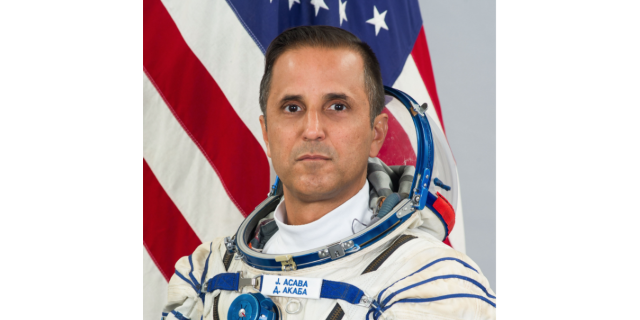
The Department of Earth Science at the University of California, Santa Barbara, CA announced recently that Joseph Acaba was chosen to be part of the Artemis Team of astronauts that will help pave the way for the next lunar missions in 2024. In a Winter 2018 publication, Acaba’s many achievements as a NASA astronaut, science teacher, and hydrogeologist were celebrated by his alma mater.
In the interview with Sophie Fisher, NASA Astronaut Joseph Acaba took a break from his duties on the International Space Station to share his thoughts. Below are excerpts from the interview.
Born in California after his parents moved from Puerto Rico, Acaba majored in geology at UC Santa Barbara. He earned a master’s in geology from the University of Arizona. It was during his years as a teacher that Acaba applied to be a mission specialist with NASA. He was selected for the Astronaut Candidate Class of 2004 and after completed training in 2006, which included shuttle and space station systems, and water and wilderness survival, became eligible for spaceflight.
When I graduated from high school, I did not know in what area I wanted to major. I knew I wanted something in the field of science having to do with the natural environment. The location from my family was also something important to consider. With my brother just up the road at Cal Poly San Luis Obispo and UCSB’s placement on the coastline, the location was perfect. UCSB had programs in areas like marine biology and geology, my ultimate major, so I knew I had options once I started.</em>
While astronauts today do not do much hands-on geology, the skills you learn as a geologist are of course applicable, and having a degree in geology opened many doors for me. Geologists learn to work independently in the field, while at the same time collaborating with others and working as a team. You learn to observe and note features in your surrounding environment. You learn to work in a laboratory setting. Those skills are important for explorers and those living in a remote environment like the International Space Station.
The work we are doing on the International Space Station is not only improving the quality of life on Earth today, but we are also learning new things about living and working in space that will become the foundation of all future space exploration. It is extremely rewarding to know our work is helping to make new discoveries that are applicable for everyday living today and for future generations.
I would tell current students that it is ok if you don’t know what you want to study. For those that do, I congratulate you. But for all, find and study something that inspires you, something that brings you joy, and something that will make a difference in our world. Have big dreams and goals. Make decisions, both small and big, that will help you achieve those dreams. And when opportunity knocks, be ready to seize it. It could open a door to something more than you could ever imagine possible.
Click the link to read more: Joseph M. Acaba ’90, NASA Astronaut, Science Teacher, Hydrogeologist
The U.S. Army Corps of Engineers has been tasked with…
Brown and Caldwell, a leading environmental engineering and construction firm,…
Humboldt State University, one of four campuses within the California…